Rules and recommendations
Having decided to renovate a room using a combination of wallpaper, it is worth considering the area, location, purpose and proportions of the room.
- When choosing the main tone, you need to start from the area. In a small room, it is inappropriate to use a dark color palette; a light pastel palette looks more harmonious, which will visually increase the area of the room.
- In a spacious room, a combination of dark colors and volumetric patterns is acceptable.
- The location plays an important role. In a room with windows facing north, it is better to use a warm palette, this will compensate for the lack of sunlight.
- On the south side, on the contrary, cold shades look more harmonious, they will give a breath of fresh air.
- In an apartment with high ceilings, you should not combine wallpaper with vertical patterns.
- You can adjust the height of the ceilings with horizontal stripes and volumetric images. The same rule works in the opposite direction, for small rooms light plain wallpaper and a small discreet pattern are suitable.
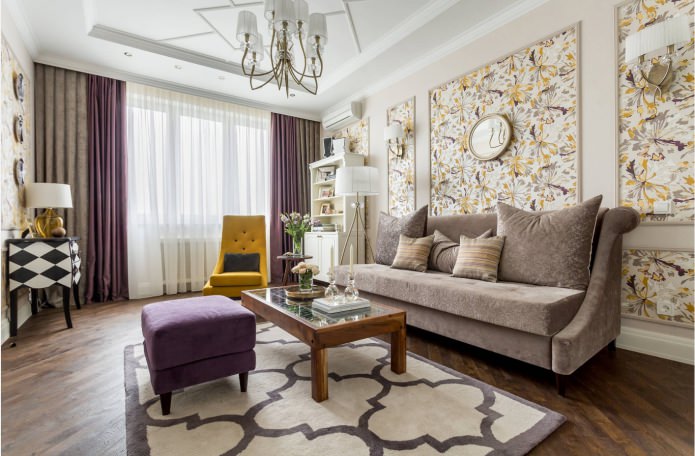
Methods of combination
Combination with vertical stripes
With the help of striped wallpaper you can visually increase the height of the ceilings. The frequency and width of the stripes depends on personal preferences. When buying material, you should stop your choice on rolls of the same size and, if possible, one collection. In this case, in the finished version, the finish will look like a single composition. The color palette can consist of two colors that are close to each other, or contrasting.

In the photo, one of the walls of the kitchen is decorated with striped wallpaper.
Horizontal combination
Horizontal patterns and stripes can “push apart” the walls and make the room wider. This type of finishing is suitable for rooms with high ceilings, in a compact room it may create the impression of a low ceiling.
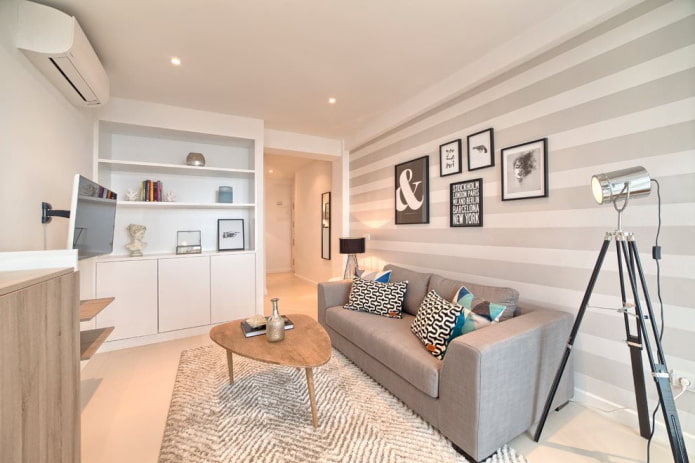
Another way to combine is to divide the wall into two parts horizontally, the upper half, as a rule, in a lighter color than the lower one. Often the lower part is made of wall panels.

Accent wall
Most often, the accent wall is the one that catches the eye when entering the room. A bright shade or a three-dimensional image will “move” the wall, this technique can make a long narrow room a little closer to a square shape. Depending on the stylistic direction, the main color can be close in tone to the accent wall or be radically different.

In the photo, the accent wall in the bedroom is decorated with pink photo wallpaper with flowers.
Monochromatic and single-color
Different shades of the same color will help to zone the space and create a play of shadows. For example, part of the bedroom is finished in a light gray shade, and the sleeping area is in a deep, rich color.

Pattern or ornament and plain
One of the most common finishing methods is the combination method. Floral patterns or ornaments can echo the style of the interior. The pattern is applied with a stencil, sticker or wallpaper. Today, you can often find collections in stores that feature plain options and those with a pattern applied to the same base.

Pattern and pattern
Completely different patterns can harmoniously exist in one room, but they should be united by a common note. This can be common motifs, elements or color.

Combining photo wallpaper with wallpaper
Photo wallpaper can significantly increase the area of the room. Perspective photo wallpaper, such as a road or a high waterfall, will stretch the room and make it wider.

The photo shows perspective photo wallpaper (a receding pier), which helps to visually increase the height of a small bedroom.
Considering that the photo wallpaper itself has a voluminous and colorful image, it is worth combining it with a calmer tone so as not to overload the room.
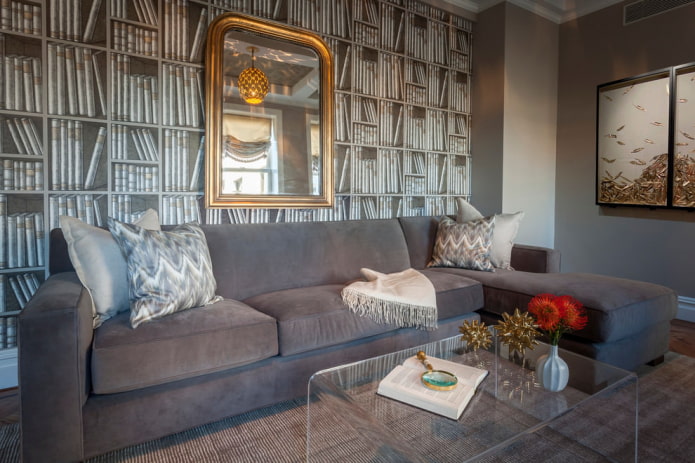
Focal Point
Background wallpaper is used to highlight a particular area, such as a fireplace or TV. Part of the wall can be a solid color that differs from the main shade or have an unusual pattern.

Decorative Ornaments
Elements framed in frames and moldings create an unusual picture. Inserts with ornate patterns can be placed against a calm shade of wallpaper. This combination is suitable for a classic interior.

In the photo in the living room in the classic style, the wallpaper is decorated with moldings.
Patchwork technique
The patchwork technique is suitable for decorating a children’s room or bedroom. The idea is to combine the overall picture from scraps of different wallpapers. When gluing, it is necessary to maintain an even seam.

Highlighting niches
An interesting solution would be to highlight niches in the wall with a different color. The recesses can be made a couple of tones darker. When decorating a niche with textured wallpaper or panels, the backlight looks good, the relief will cast interior shadows.

Combining wallpapers with different textures
Combining different textures looks harmonious in almost any room in the apartment. In small rooms, wallpaper with a shiny surface will increase the space due to its reflective properties. In addition, they look interesting in contrast with a matte canvas.

Room zoning
There are several ways to divide a room into zones, one of which is division by color and texture. A kitchen combined with a living room will be divided by wallpaper of the same texture, but different shades of the same spectrum. A good option would be textured paintable wallpaper.

The photo shows two types of wallpaper with floral and checkered print.
Combination with brick-like wallpaper
Brickwork is most often associated with the loft style. In a small apartment, it is permissible to replace the natural material with imitation wallpaper. Red brick-like wallpaper goes well with matte gray or white material. White brick looks harmonious with light walls.

How to combine wallpaper by color?
Monochromatic combination
A calm color combination, despite the saturation, can be called monochromatic. These are shades of the same color, differing in saturation. In the interior, a more juicy shade can be used to designate desired zones or visually divide the space.



The photo shows a monochromatic combination of colors on combined wallpaper.
Complementary combination
This is a combination of contrasting, opposite colors. For example, red and green, purple and yellow, orange and blue. A combination of this kind will suit the decoration of any room. A combination of calm shades can be used in the living room and bedroom, and bright ones are suitable for a child’s room.



Analogous
At first glance, analogous colors are completely different, but their use in the interior looks harmonious, each shade smoothly flows from one to another. As a rule, this is a combination of two or three adjacent shades from the color wheel.



Combination of individual colors (table)
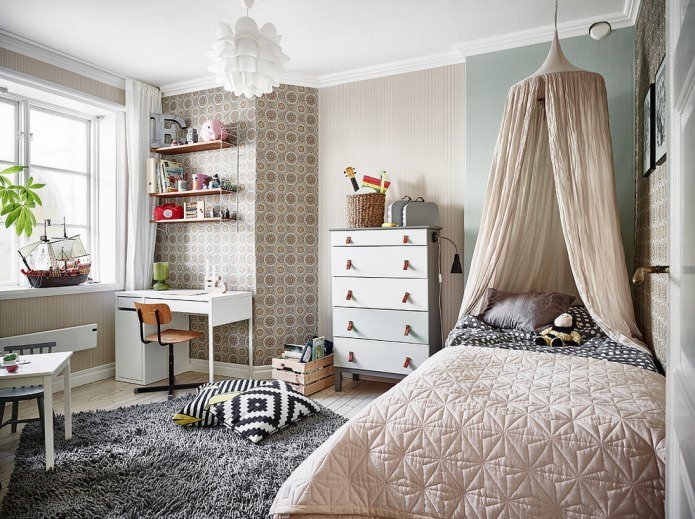
The photo shows a combination of three types of wallpaper in the interior of a child’s room.
Photo in the interior of rooms in an apartment
Living room
There are many ideas for decorating walls in the living room. The material and pattern are selected depending on the style. In a spacious hall with a corner sofa, the accent wall technique looks harmonious. A beautiful pattern and rich colors will mark the place of rest.

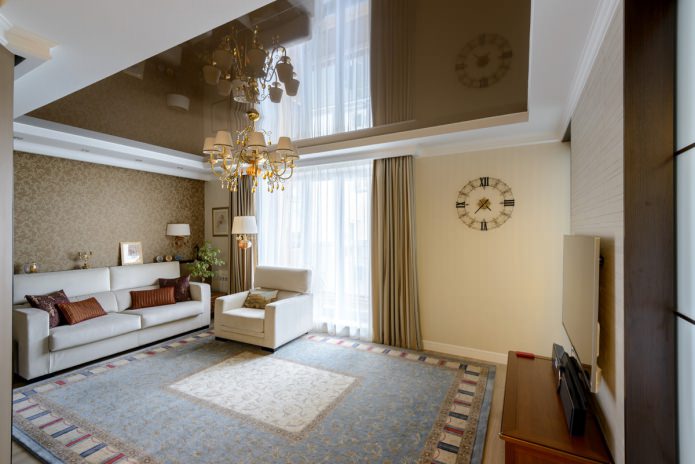
Bedroom
In the bedroom, as a rule, preference is given to calm shades. A combination of a calm shade of the main wallpaper and photo wallpaper with a plant print at the head of the bed will look harmonious.
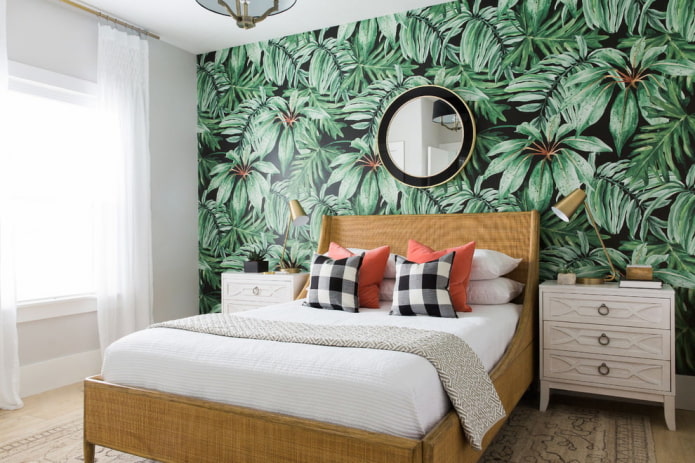

Kitchen
In the kitchen, it is more practical to combine wallpaper above the dining area and tiles in the cooking area. The colors can overlap.

The photo shows a horizontal combination of two types of wallpaper – plain and floral, the joint is decorated with white molding.

Children’s room
In the children’s room, you can safely combine bright and rich colors. For little ones, you can use the patchwork technique with colors and patterns that match the gender. One of the walls decorated with photo wallpaper or wallpaper with patterns will also look good.


Hallway and corridor
In a spacious or open hallway, you can combine simple flat and textured wallpaper with imitation of different materials.


The photo shows a practical combination of decorative panels with wallpaper.
Combination with other finishing materials
Wallpaper and paint
The combination of paint and wallpaper looks good in the bedroom. A smooth painted surface will be complemented by canvases with an ornament, a checkered pattern or an intricate design.

Combination with decorative stone
The combination of wallpaper and stone looks harmonious in the living room or hallway. The corners and part of the wall are decorated with stone. The material can be both natural and artificial.

Combination with brick
By combining wallpaper and brickwork, you can get a brutal loft style and a delicate Provence. Depending on the color and decorative filling, you will get a completely opposite apartment design.

The photo shows a combination of wallpaper with a brick wall in the bedroom interior.
Wallpaper and panels
A combination of wallpaper and panels will be a good option for finishing a hallway, living room or children’s room. As a rule, panels are used to finish the lower part of the wall using the horizontal combination method. The variety of choice allows you to make repairs in both classic and modern styles.

Plaster
Combination for any part of the house. Plaster sets the main tone in the room, wallpaper is an accent element. The combination can be with plain wallpaper, wallpaper with a discreet pattern and photo wallpaper.

Tiles
Combination for the kitchen and bathroom. The work area and the area in contact with water are finished with tiles, the rest is left to wallpaper. The combination can have a contrasting combination or have a common color and elements.

The photo shows a combination of wallpaper with mosaic tiles.
How to design a transition when combining
No transition
The simplest and most common way is no transition. Wallpaper sheets are glued end to end. It is necessary to remember that for the best result, you need to prepare and level the surface. This method is well suited for an accent wall.

Moldings
A beautiful and elegant way of decoration. Visually looks like a painting or a panel. The main tone is chosen in a calm shade, the second part can have either a simple geometric or an unusual shape and is finished with moldings along the edge.

Wallpaper border
The border is placed along the upper edge or along the central part. It will add zest to the interior. Looks harmonious in the living room, bedroom and children’s room.

Features of decorating a small room
- In a small apartment, for example in Khrushchev-era buildings, it is preferable to choose light shades when combining.
- The vertical or horizontal direction of the pattern or lines will help to adjust the space.
- Simple drawings and patterns can also visually enlarge the room. What patterns can visually expand the space can be seen here.
- Mirror surfaces can significantly contribute to expanding the boundaries.
- A pair of tall mirrors framed in frames will completely change the appearance of the interior.

In the photo, one of the walls is decorated with wallpaper with horizontal stripes, which visually increases the width of the children’s room.


In the photo, one of the walls is decorated with patterned wallpaper, this technique will visually make a long small room more proportional.
Layout errors
Some mistakes in combining can spoil the overall picture.
- You should not place large furniture along a wall with large patterns, it is better to choose plain background wallpaper.
- In a small room, a dark color scheme would be a wrong decision. Light shades and bright decorative elements will look more harmonious. Also, you shouldn’t use three or more colors.
- In a narrow room, patterned wallpaper is not applied to a large wall, as this will make the room even narrower.
- In an apartment with low ceilings, horizontal stripes and patterns will shorten the space even more.

Combining liquid wallpaper
Liquid wallpaper deserves special attention. It allows you to create unique pictures, even diagonally, and is easy to apply. Liquid wallpaper has a soft and warm surface to the touch. The material is applied according to the principle of textured plaster. For an ideal result, it is also necessary to prepare the surface.




In the photo, the TV area is highlighted with liquid wallpaper.

Now reading:
- Sofa bed: 80 interior ideas for stylish and comfortable sleep.
- Sliding wardrobe for bedroom: 60+ photos, contents and design solutions
- Advantages and disadvantages of installing a sink over a washing machine (27 photos of interiors)
- 22 Houseplants for Shady Corners: Names and Photos
- Scandinavian Bathroom: 57 Photos for Interior Inspiration